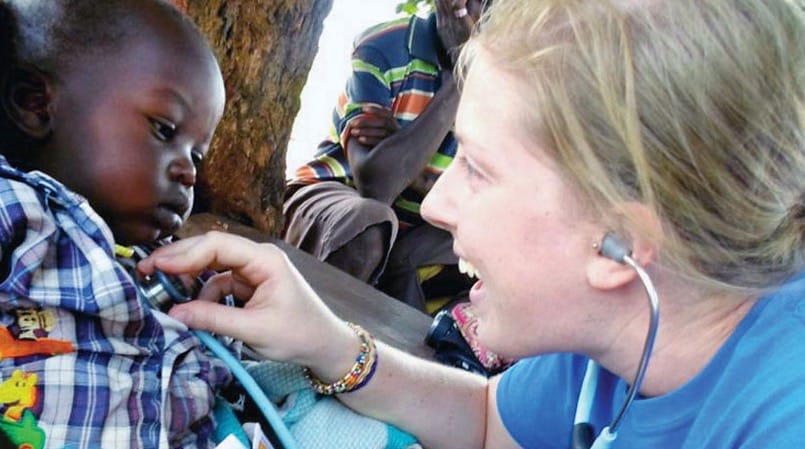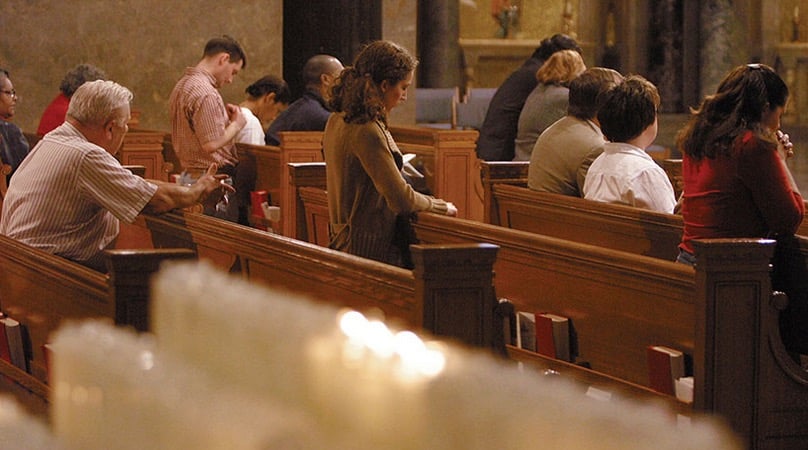Service can be contagious. Once we work service into our schedules and see the benefits, it becomes a way of life. But for those who are in the beginning stages and looking for ways to serve, there are a number of things to consider.
First, whether we’re single or parents of a young family or grandparents, we need to take into consideration our personalities and capabilities.
“The starting point of being of service is to realize that I have things to contribute and so I should contribute them to the greater good,” said family therapist Lawrence Nichta, who practices in Lyndhurst, Ohio. “On the other hand, we have to realize that we’re not going to change the world with the service we do … but we’ll change our small part of it.”
Service with a smile
Nichta warns against volunteering for the wrong reasons. If we volunteer to fill a void within ourselves, that’s not really service. If the goal is to make ourselves feel better rather than the other person, we’re going in the wrong direction. Also, it can be counterproductive to habitually overcommit.
“Our service should stem from an attitude of gratitude,” Nichta said. “It doesn’t take but a casual look to see that there are people who are less fortunate than we are. We have to reflect and pray on what we have and share with others from that. It should be done out of charity, not guilt. We have to be realistic.”
Laura Castro is a recruiter for Catholic Volunteer Network and helps people evaluate their service potential. She’s lived a life of service, beginning with the Capuchin Franciscan Volunteer Corps Midwest on an 18-month service trip to Peru. She recommends a careful assessment of what the community really needs and what we can do to fulfill those needs.
“We could be a real go-getter, but we need to be patient,” Castro said. “We must be patient and see the bigger picture. We have to be open and flexible and allow ourselves to be guided by God. He’ll show us the right way, but in his time, not ours.”
The most important thing, she advised, is to approach service in humility and with an open heart. That way we can be available to God and his people rather than basing our service on our own wants and needs.
Finding the right fit
| Volunteer Opportunities |
|---|
|
It is important to check your local parish for volunteer opportunities, but outside of the parish, agencies and opportunities for both domestic and international service are numerous. Here are some organizations: St. Vincent de Paul Society: svdpusa.org Christian Appalachian Project: christianapp.org Jesuit Volunteer Corps: jesuitvolunteers.org Capuchin Franciscan Volunteer Corps: capcorps.org Catholic Volunteer Network: catholicvolunteernetwork.org Bethlehem Farm: bethlehemfarm.net Nazareth Farm:
nazarethfarm.org Catholic Charities USA: catholiccharitiesusa.org Marianist Mission: marianistmission.org Food For The Poor: foodforthepoor.org
|
There are a wide variety of needs in our communities that need our help. Regardless of the type of service required, they all have one thing in common: Needs are not seasonal; they exist year-round. Volunteering throughout the year not only fills these needs, but it helps develop a pattern of service and allows you to form relationships with fellow volunteers and those you serve.
Certain types of service are better for individuals who usually have more flexibility than families.
For example, a single person could be an overnight supervisor at a homeless shelter or a teacher who coaches and tutors on weekends. Some volunteer opportunities are full-time and life-changing, such as missionary work that involves moving to a different city or country.
Families, on the other hand, do well with manual labor like home repair or gardening for the less fortunate or the elderly. If they are looking for a bigger time commitment or to get out of their comfort zone a little, they can commit to weeklong volunteer projects such as those at two Catholic communities in West Virginia: Bethlehem and Nazareth Farms, which focus on communal service work in their local areas.
Some programs allow parents to volunteer for an extended time in a particular ministry while the children are able to be part of the community. An example of that would be families serving overseas together in mission territory. The fact that children form relationships more easily than adults helps to enhance the service experience of the entire family.
When considering service as a family, it’s important to take into account our children’s aptitude, capabilities and attention span.
According to James Lindsay, executive director of Catholic Volunteer Network, “younger children can participate in home visits to the sick or elderly, or help with basic food preparation at a soup kitchen, or with bagged lunches to distribute to the homeless. High school and college students are great at leading sports or Bible camps for younger kids, and working on home repair or neighborhood cleanup projects.”
Faith and service
Lindsay also gives some solid advice about volunteering in general.
“Volunteering in one’s local area, for whatever amount of time possible, is very important and worthwhile,” he said. “For those who are looking for something beyond their own community and who have the flexibility to venture to another city, state or even country, our programs offer valuable opportunities to serve those in need.”
Lindsay recommends looking for programs that provide opportunities for reflection on the meaning of service. He also says it is important to understand the connection between one’s faith and service.
“We’ve seen the transformational impact that serving as a volunteer has on our alumni,” Lindsey said. “Many continue to be active, committed members of their faith communities and neighborhoods. Volunteering can change your life forever.”
Service is definitely a way of life for Gordon Wong, a manager for college organizing at ONE Campaign in Washington, D.C. ONE is a nonprofit, nonpartisan advocacy organization that fights to end extreme poverty, particularly in sub-Saharan Africa.
Wong first began volunteering as part of Amate House, a young adult volunteer program of the Archdiocese of Chicago. Members are full-time volunteers who are put in a variety of positions that match their interests and skills.
He worked as a tenants-rights supporter in a housing organization on the north side of Chicago. A graduate of the College of the Holy Cross, he was inspired by the college’s alumni, who followed the long tradition of postgraduate service.
“It’s hard to point to one thing that is important to serving, but I do believe that service is an integral component of my faith,” he said.
Small scale, big effect
You don’t need to enlist with an organization in order to serve others. Rather, limitless possibilities exist all around you.
There may be an elderly neighbor who would appreciate a meal, or leaf raking and snow shoveling, or simply a visit. Nursing homes are usually welcoming of people — even entire families — who would like to give help and companionship to their residents. Volunteering at a children’s hospital can boost the spirits of not only the small patients, but of yourself as you bring joy to a sick child. Meal programs, soup kitchens, women’s shelters and homeless shelters always seem to be in need of workers and donations. Also, remember that small-scale opportunities present themselves on a daily basis, like assisting the elderly, moms with small children or the disabled, or picking up trash along your walking route or at your local park.
Regardless of how or where we serve, the most important element is to remember our obligation as Christians to bring Christ to others. We should be reminded of his words to his disciples in St. Matthew’s Gospel: “Whatever you did for one of these least brothers of mine, you did for me.”
Marge Fenelon writes from Wisconsin.







